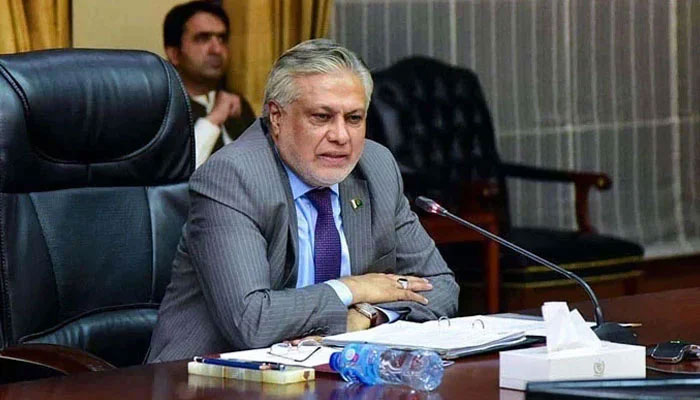Pakistan can become part of G20 by 2030, says Dar
Dar says that March 4 marks completion of one year of Prime Minister Shehbaz Sharif-led government
ISLAMABAD: Deputy Prime Minister Ishaq Dar on Tuesday expressed his concern that the Competition Commission of Pakistan was taking decisions against certain sectors but the courts had issued stay orders preventing such cases to reach their logical conclusion.
He, however, expressed satisfaction over the pace of economic development, stating the country will soon stand among developed nations and likely to become a part of G20 by 2030. He emphasised that all regulatory bodies should continue to work collaboratively and effectively to further accelerate the country’s growth.
Senator Dar made these remarks while addressing the foundation stone-laying ceremony of the new headquarters of Competition Commission of Pakistan (CCP) in the Mauve Area, G-10, Islamabad.
The ceremony was attended by Federal Minister for Law and Justice Azam Nazeer Tarar, Finance Minister Muhammad Aurangzeb, State Minister for Finance Ali Pervaiz Malik, Federal Secretary for Law and Justice Raja Naeem, Chairman CCP Dr Kabir Ahmed Sidhu, Chairman Securities and Exchange Commission of Pakistan (SECP) Akif Saeed and other senior officials. The deputy prime minister noted that while the CCP takes bold decisions, courts have issued stay orders preventing such cases from reaching their logical conclusion. He, however, expressed the hope that under the leadership of Law Minister Nazeer Tarar and Finance Minister Aurangzeb, the CCP would achieve further success.
He emphasised that Pakistan happens to be rich in natural resources and needed to explore its hidden wealth. “As a nuclear and missile power, the country is on the path to joining the ranks of developed nations,” he said, adding Pakistan could become a part of the G20 by 2030 if all regulatory bodies work together.
Senator Dar noted that March 4 marked the completion of one year of Prime Minister Shehbaz Sharif-led government, coinciding with the foundation stone-laying ceremony of the CCP’s new building—a significant milestone. He pointed out that in 2018, Pakistan was ranked as the world’s 24th largest economy, just four spots away from G20 membership.
Dar claimed that certain elements were attempting to push Pakistan towards economic default, as they find its nuclear power status intolerable. Stressing the importance of collective efforts, he said: “If everyone works as diligently as PM Sharif, Pakistan would soon achieve economic development and stability”.
Speaking on the occasion, Finance Minister Aurangzeb said macroeconomic stability had been achieved in the country, and structural reforms were ongoing. He emphasized that while it was important for the CCP to have its own building, it was equally crucial for the commission to continue its efforts with the same dedication. State Minister Pervaiz Malik highlighted the significant role of CCP as a regulatory body, noting that it plays a vital part in improving markets and the economy by promoting fair competition.
Chairman CCP Dr Kabir Ahmed Sidhu said the commission had restructured its legal department to effectively pursue cases in courts. According to him, it has established a Market Intelligence Unit, a new department dedicated to identifying cartelisation and anti-competitive practices in the market. Since inception, CCP has investigated cartels, prevented abuse of dominance and curbed deceptive marketing and unfair trade. In 2024, CCP imposed Rs275 million in penalties for cartelisation, collusion, and deceptive marketing, recovered Rs100 million, resolved 73 court cases and issued 32 show-cause notices across fertilizer, real estate, education, public procurement, and pharmaceutical sectors.
-
 Savannah Guthrie Sends Desperate Plea To Mom Nancy Kidnapper
Savannah Guthrie Sends Desperate Plea To Mom Nancy Kidnapper -
 NBA All-Star 2026 Shake-up: Inside The New USA Vs World Tournament Format
NBA All-Star 2026 Shake-up: Inside The New USA Vs World Tournament Format -
 Warner Bros Consider Reopening Deal Talks With Paramount, Says Reports
Warner Bros Consider Reopening Deal Talks With Paramount, Says Reports -
 Andrew Mountbatten Windsor Faces Future With UK MPs, Says Expert
Andrew Mountbatten Windsor Faces Future With UK MPs, Says Expert -
 Shamed Andrew Told 'nobody Is Above The Law' Amid Harrowing Silence
Shamed Andrew Told 'nobody Is Above The Law' Amid Harrowing Silence -
 Gisele Bundchen Melts Hearts With Sweet Bike Ride Glimpse Featuring Son
Gisele Bundchen Melts Hearts With Sweet Bike Ride Glimpse Featuring Son -
 Prince William Found Meghan Markle ‘quite Refreshing’ At Start
Prince William Found Meghan Markle ‘quite Refreshing’ At Start -
 Kate Middleton Knew Should Could Not Be ‘voice Of Reason’ With Prince Harry
Kate Middleton Knew Should Could Not Be ‘voice Of Reason’ With Prince Harry -
 Rihanna Has Wardrobe Malfunction At A$AP Rocky Fashion Show
Rihanna Has Wardrobe Malfunction At A$AP Rocky Fashion Show -
 Prince Harry Felt System Had ‘one Rule For Him, One For Prince William’
Prince Harry Felt System Had ‘one Rule For Him, One For Prince William’ -
 Jake Paul's Fiancée Sends Him Over The Moon Over Stunning Victory
Jake Paul's Fiancée Sends Him Over The Moon Over Stunning Victory -
 Harper Beckham Sends Valentine’s Love Amid Brooklyn Family Drama
Harper Beckham Sends Valentine’s Love Amid Brooklyn Family Drama -
 Why Prince William, Kate Middleton 'partnership' Is Important For Monarchy
Why Prince William, Kate Middleton 'partnership' Is Important For Monarchy -
 Katie Price Drama Escalates As Family Stays In Touch With Ex JJ Slater
Katie Price Drama Escalates As Family Stays In Touch With Ex JJ Slater -
 Critics Target Palace Narrative After Andrew's Controversy Refuses To Die
Critics Target Palace Narrative After Andrew's Controversy Refuses To Die -
 Sarah Ferguson’s Delusions Take A Turn For The Worse: ‘She’s Been Deserted’
Sarah Ferguson’s Delusions Take A Turn For The Worse: ‘She’s Been Deserted’




